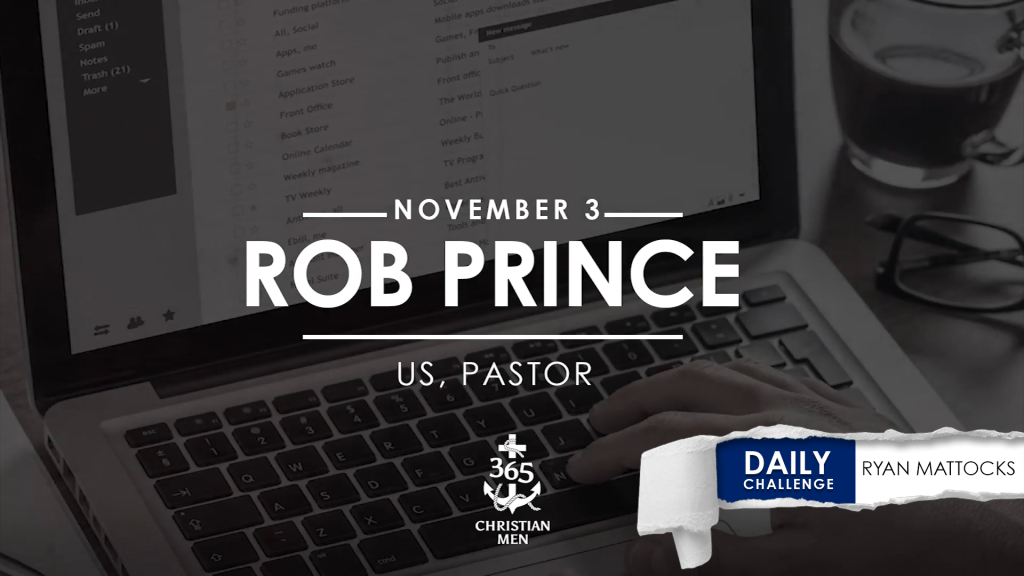November 3. Rob Prince. On this date in 2013, Rob became the lead pastor for Central Church of the Nazarene in Flint, Michigan—where the auto industry has taken multiple serious hits. There’s still lead in the drinking water in a lot of homes, and Rob experiences more pain in a week than many people have in a lifetime. But he is one of the most cheerful, upbeat men around, always ready with a word of encouragement. Here’s his story.
Healing isn’t guaranteed, but God’s presence is.
Rob was reading email at his office desk when a terrible pain hit his head as if he had been smashed with a baseball bat.
At first, Rob thought it was just a normal headache. He had had migraines since he was in pre-school, after all. But this pain felt different. It was heavy, hard, brutal. He had never felt pain like what he was feeling at that moment. Barely able to move or think, he reached out and rummaged through his desk to find some ibuprofen. But after taking it, he started to realize that maybe what he was feeling wasn’t a migraine. Maybe it was worse.
Thoughts raced through his aching mind as he began to list what could possibly be wrong. Was it a stroke? An aneurysm? Something else he didn’t know? He stumbled to the outer office and met his assistant, who looked at him in shock. She asked if he needed to go to the hospital.
He did.
After arriving at the hospital, Rob lost consciousness and was out for three days. He heard whispers of possible brain surgery and being transferred to another hospital to help him, and he finally learned what was wrong.
He had a bleeding in the brain. Many people who have it don’t even survive the day.
A miracle had happened. The bleeding stopped on its own, and surgery wasn’t needed. He was in the hospital about a week. Able to return to work in three. But his miracle didn’t end the way most people expected it would. His health didn’t go back to normal.
Instead, his condition left him with chronic pain. The migraines that had been a nuisance in childhood suddenly became a dreaded companion.
After the hemorrhage, Rob had a migraine that lasted four months—with no relief. All he could do was go to work, survive the hours, and return home to lie down in darkness and silence, hoping and praying for relief. The medications and injections weren’t working. Relief was just a dream. How could he face another tomorrow of pain that just wouldn’t stop?
He desperately turned to God. Where was He in all this suffering? What purpose could there be in finding no relief? Why didn’t He just heal him?
Years after the hemorrhage, Rob finally found a medication that lessened his migraines. They weren’t cured, but he no longer had them every day—just most days. Despite the continued, lessened pain, Rob learned, through his chronic pain, how to empathize with others who suffered.
Rob knew God could heal him. God could take away the pain. But even if God didn’t, he could still live an amazing life. Rob could help others who were suffering like he was, and they would be willing to listen because he was suffering, too. He could provide them comfort and show them God’s love. He could remind them they weren’t alone, and in their suffering, God could give them the strength to make it through any trial.
He even wrote a book to share his story: Chronic Pain: Finding Hope in the Midst of Suffering. Rob wanted people to know that, despite the suffering of chronic pain, anyone could live a victorious life and be a blessing to others if they allowed it.
“People can make it, even in extreme cases,” Rob said. “God will give you the strength.”
“He went away a second time and prayed, ‘My Father, if it is not possible for this cup to be taken away unless I drink it, may your will be done’” (Matthew 26:42 NIV).
Think about the pain or suffering you’ve endured. How can you relate to other people who have gone through similar situations? Healing isn’t guaranteed, but God’s presence is.
Based on an interview with Rob Prince, 2019.
Story read by: Nathan Walker





